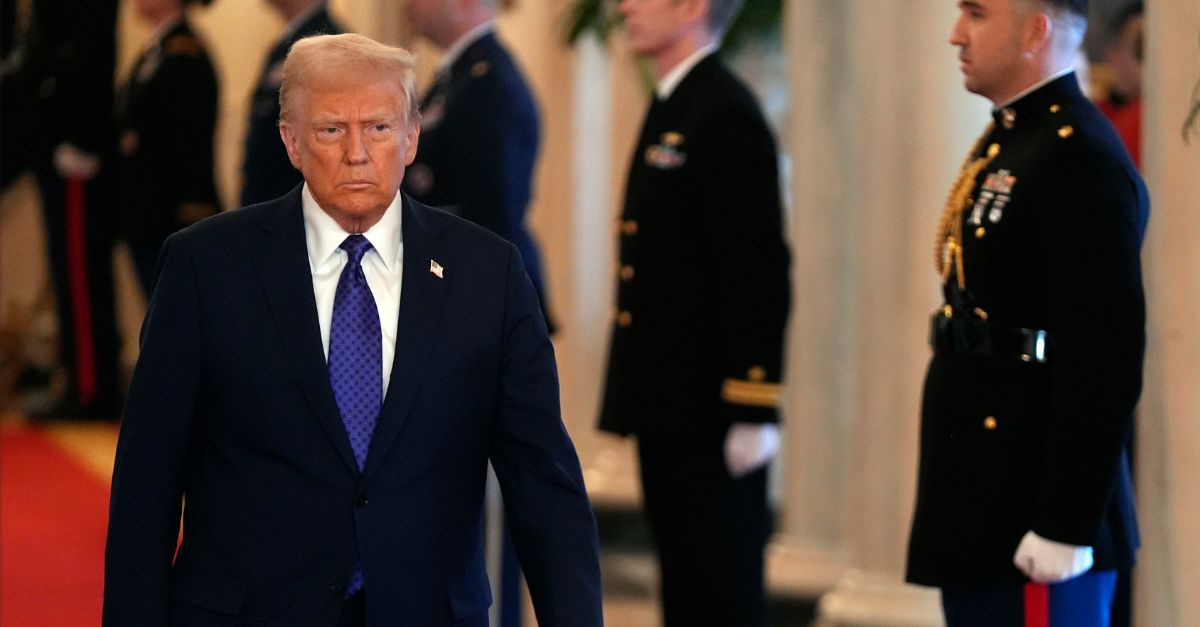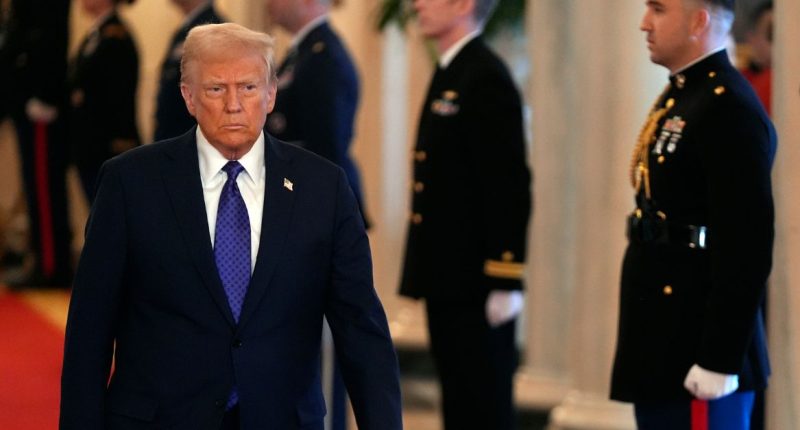
President Donald Trump arrives to sign the Laken Riley Act in the East Room of the White House, Wednesday, Jan. 29, 2025, in Washington. (AP Photo/Evan Vucci)
The Trump administration is asking a federal appeals court to block a directive from a lower court ordering the government to pay hundreds of millions of dollars in foreign aid funds by midnight on Wednesday.
The Wednesday morning filing with the U.S. Circuit Court in Washington, D.C., came less than a day after U.S. District Judge Amir H. Ali issued an order to enforce his previous directive prohibiting the administration from implementing its across-the-board freeze on such payments.
The coalition of aid groups that filed the lawsuit last month presented evidence that U.S. State Department and U.S. Agency for International Development (USAID) had repeatedly failed to abide by the district court’s underlying order during an emergency hearing Tuesday morning.
At one point during the proceedings, Ali lost patience with the government’s attorney as the court requested details regarding why the temporary restraining order was being flouted by the administration.
A frustrated Ali concluded the hearing with a series of onerous directions to enforce compliance with the temporary restraining order unfreezing the funds for contract payments on work completed before Feb. 13, 2025.
“I don’t know why I can’t get a straight answer from you,” the judge intoned, according to a courtroom report by Politico journalist Kyle Cheney. “Are you aware of an unfreezing of the disbursement of funds for those contracts and agreements that were frozen before Feb. 13?”
The government lawyer replied: “I’m not in a position to answer that.”
That back-and-forth set the tone for the arguments between the U.S. Department of Justice and the nonprofit plaintiffs in the case.
“We’re now 12 days in,” the judge reportedly said later on — referring to when the temporary restraining order was initially entered. “You can’t answer me whether any funds that you kind of acknowledged are covered by the court’s order have been unfrozen?”
The administration just hours after the hearing responded by asking the appeals court to issue a short-term administrative stay on Ali’s order as well as a stay pending appeal, asserting that it would be impossible for the government to abide by the directive within the allotted time frame.
“In this action under the Administrative Procedure Act, the district court has ordered the federal government to pay nearly $2 billion in taxpayer dollars within 36 hours, without regard to payment-integrity systems that would ensure that the monies claimed are properly owed, without regard to the federal government’s meritorious arguments to the contrary, and without so much as addressing the government’s sovereign-immunity defense,” the 26-page filing states. “To be very clear: the government is committed to paying for work that was properly completed, so long as the claims are legitimate. What the government cannot do is pay arbitrarily determined expenses on a timeline of the district court’s choosing, so that a district court creates a payment plan at odds with the President’s obligations under Article II and bedrock principles of federal sovereign immunity.”
In Wednesday’s emergency motion, the administration claimed that even if the appeals court declines to halt Ali’s order, government leaders have already determined that the ordered payments “cannot be accomplished in the time allotted by the district court.”
The filing goes on to call the plaintiffs’ lawsuit a “(meritless) challenge” filled with “deeply flawed arguments” that somehow resulted in the court overstepping its jurisdiction and requiring “massive outlays of funds under thousands of instruments.”
“The district court’s order is incredibly intrusive and profoundly erroneous. It appears to contemplate the immediately outlay of nearly $2 billion,” the filing states. “The government has no practical mechanism to recover wrongfully disbursed funds that go out the door to entities that have complained that they are near insolvency. And the district court’s broad exercise of jurisdiction, resolving monetary claims beyond its proper authority and addressing the hypothetical claims of parties not before the court, was without legal basis. The district court’s order should be stayed pending appeal.”
The appeals court ordered the plaintiffs in the case to respond to the administration’s filing by 1 p.m. Wednesday.







